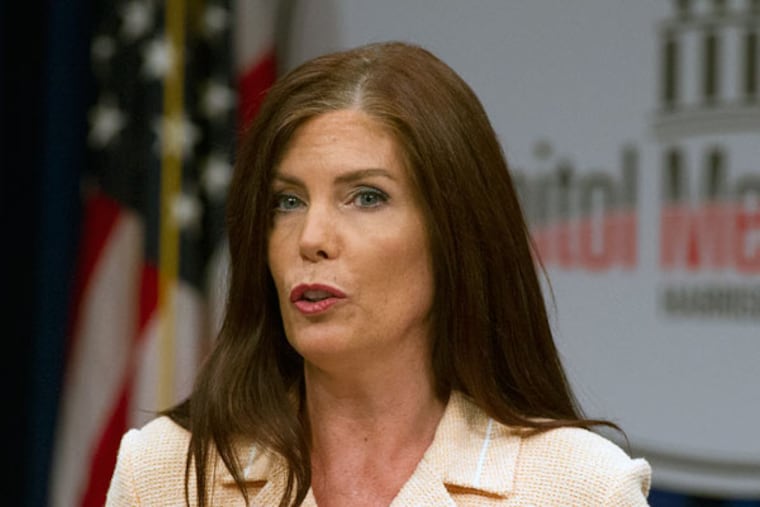As prosecutors investigated Kane, they homed in on her private email
As Attorney General Kathleen Kane plotted to leak secret grand jury information and instructed aides to spy on her employees' emails, prosecutors said, she used personal email accounts to conduct business.

As Attorney General Kathleen Kane plotted to leak secret grand jury information and instructed aides to spy on her employees' emails, prosecutors said, she used personal email accounts to conduct business.
Revelations about Kane's use of personal emails led Montgomery County prosecutors to serve search warrants for her Yahoo and AOL email accounts as they built a criminal case against her.
On Monday, Kane was held for trial on charges of leaking confidential information to embarrass a critic and then lying about it under oath.
In documents unsealed Wednesday, investigators said Kane and other staffers frequently used personal email accounts for business. But there was a "a large segment of time" last spring during which few emails were sent or received from her personal accounts on the government servers, prosecutors wrote in an affidavit justifying their request to search her private accounts.
"We believe this lack of recovered electronic communications is simply because . . . they went from one personal email account to another personal email account," the affidavit said.
Chuck Ardo, a spokesman for the Attorney General's Office, said there is no policy restricting use of personal email by employees.
"The attorney general communicates with all kinds of people associated with the office at all hours of the day and night," he said. "So it comes as no surprise that she uses her personal email on occasion."
Investigators learned of Kane's use of private emails when, in reviewing the work emails of others in her office, they saw that she had used her private email account to communicate with some members of her staff.
Kane's use of private email accounts came as prosecutors say she instructed her top aides to spy on the emails of staffers in her office. She tasked aides to "secretly or surreptitiously review emails of employees," Adrian King, her former first assistant, testified to a grand jury.
Patrick Reese, chief of Kane's security detail, is charged with contempt of court for searching email servers and accessing private grand jury information.
First Assistant District Attorney Kevin Steele said Wednesday that he could not comment on whether prosecutors obtained any significant evidence through Kane's emails.
Kane's lawyer, Gerald Shargel, could not be reached for comment Wednesday.
In making their case to search Kane's email accounts, prosecutors provided examples of her use of personal email.
In one such exchange, Kane received an email on her AOL account from Linda Dale Hoffa, a former top prosecutor in her office. Hoffa wrote that she had received a call from First Assistant U.S. Attorney Lou Lappen, expressing federal prosecutors' "displeasure" with Kane's statements about a criminal investigation she had closed without filing charges.
The email came the day after The Inquirer published an article revealing that Kane had shut down an undercover sting investigation that had caught several Philadelphia Democrats on tape accepting money or jewelry from a lobbyist.
In defending her decision to close the case, Kane told reporters that federal authorities had reviewed the case and found it to be without merit.
"They would like us to stop making this representation because we really don't know what their thinking was on this matter," Hoffa wrote in a March 17, 2014 email to Kane.
Despite that, Kane continued to say publicly that federal authorities had found the sting case unworthy of prosecution.
Philadelphia District Attorney Seth Williams later resurrected the case and brought corruption charges against six former or current Democratic officials. Four have pleaded guilty. Charges are pending against the other two.
Documents made public Wednesday also provided new information about the investigation into what prosecutors described as a leak to the Philadelphia Daily News. Kane is charged with providing the newspaper with confidential material in an effort to damage the reputation of a critic.
Prosecutors say Kane arranged for King, her former top aide, to get the material to Josh Morrow, a political consultant. Morrow, in turn, gave it to a Daily News reporter.
Authorities say King was an unwitting participant in the transfer, unaware of what was being passed along.
According to the newly released documents, Morrow told a grand jury last year that he had spoken with Kane only briefly at the time of the transfer and that "nothing of substance was discussed." He said he had talked in some detail, though, with King.
In a new appearance six weeks later, Morrow changed his story substantially, according to a filing by a special prosecutor in the case. Morrow wanted to "correct some previous misstatements he made concerning Adrian King," the filing said.
In his second round of testimony, Morrow said he not had any extensive talks with King about the leak.
As for Kane, in his new appearance, Morrow exercised his Fifth Amendment privilege against self-incrimination and refused to answer questions about his conversations with her.
But Thomas Carluccio, the special prosecutor in the case, later won a ruling from the Supreme Court that stripped away Morrow's ability to assert the his Fifth Amendment privilege. Carluccio successfully argued that Morrow was not in criminal jeopardy and thus, could not assert the privilege.
As a consequence, according to documents and testimony, Morrow provided damaging testimony about Kane in June, telling detectives she had explicitly briefed him on what was to be leaked.
610-313-8116
@Lmccrystal Staff writer Maria Panaritis contributed to this articvle.